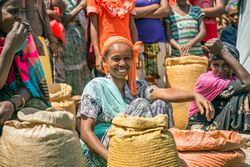The role of social sanctions for economic exchanges in developing countries
In economic exchanges, social capital provides powerful sanctioning mechanisms. However, when no formal contracts and sanctioning agencies exist, many economic exchanges rely on informal arrangements or contracts that cannot be enforced by courts or monitored by external parties. The EU-funded SSD (Social capital and enforcement of informal contracts in developing economies) project examined how social capital generates social sanctions in enforcing informal arrangements. Focusing on microfinance, project partners studied the function of social sanctions in enforcing bank repayment. They found that under the same conditions, social sanctions could also be used by a group to enforce collective default. Further to this, beliefs or norms are essential in eliciting proper repayment behaviour from group members. The SSD team conducted a lab experiment involving a microfinance group under joint liability where members could decide to exclude any member from a collective activity. It found that repayment decisions are linked to individual incentives, apart from social sanctions where members punish cheaters even at the expense of their own direct benefit. To study the long-run participation of traditionally disadvantaged villagers, researchers conducted a census of microfinance groups in northern India. Findings reveal that the lower caste is more likely to abandon self-help groups and their groups are more likely to fail. Conversely, poor landless agricultural workers benefit greatly from participation and typically receive over double the amount of bank loans given to members with larger landholdings. A panel survey of 1 500 families studied the long-run effects of microfinance group participation and found self-help group members much more likely to enrol their children in school. This led to continued education and lower dropout rates. A study of social sanctions and pressures for interpersonal redistribution among the Bamileke people in Cameroon revealed that elder siblings support younger ones early on. Later, this was reciprocated. However, such arrangements impact negatively on investment and effort. SSD has shed light on the nature and use of social sanctions in enforcing informal contracts.



